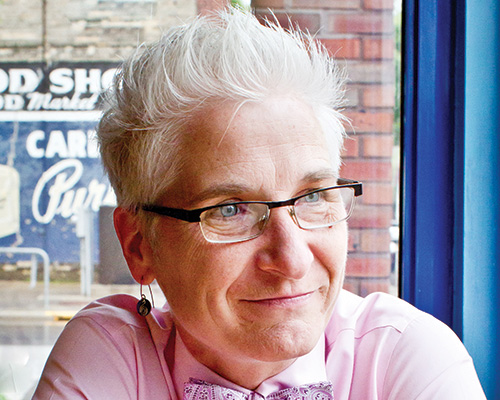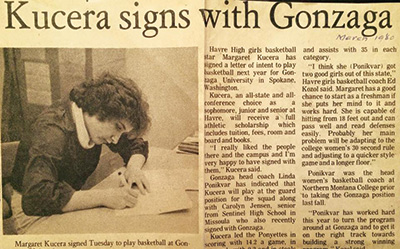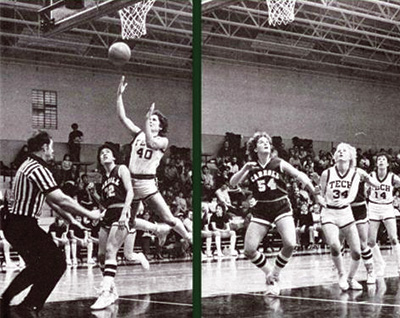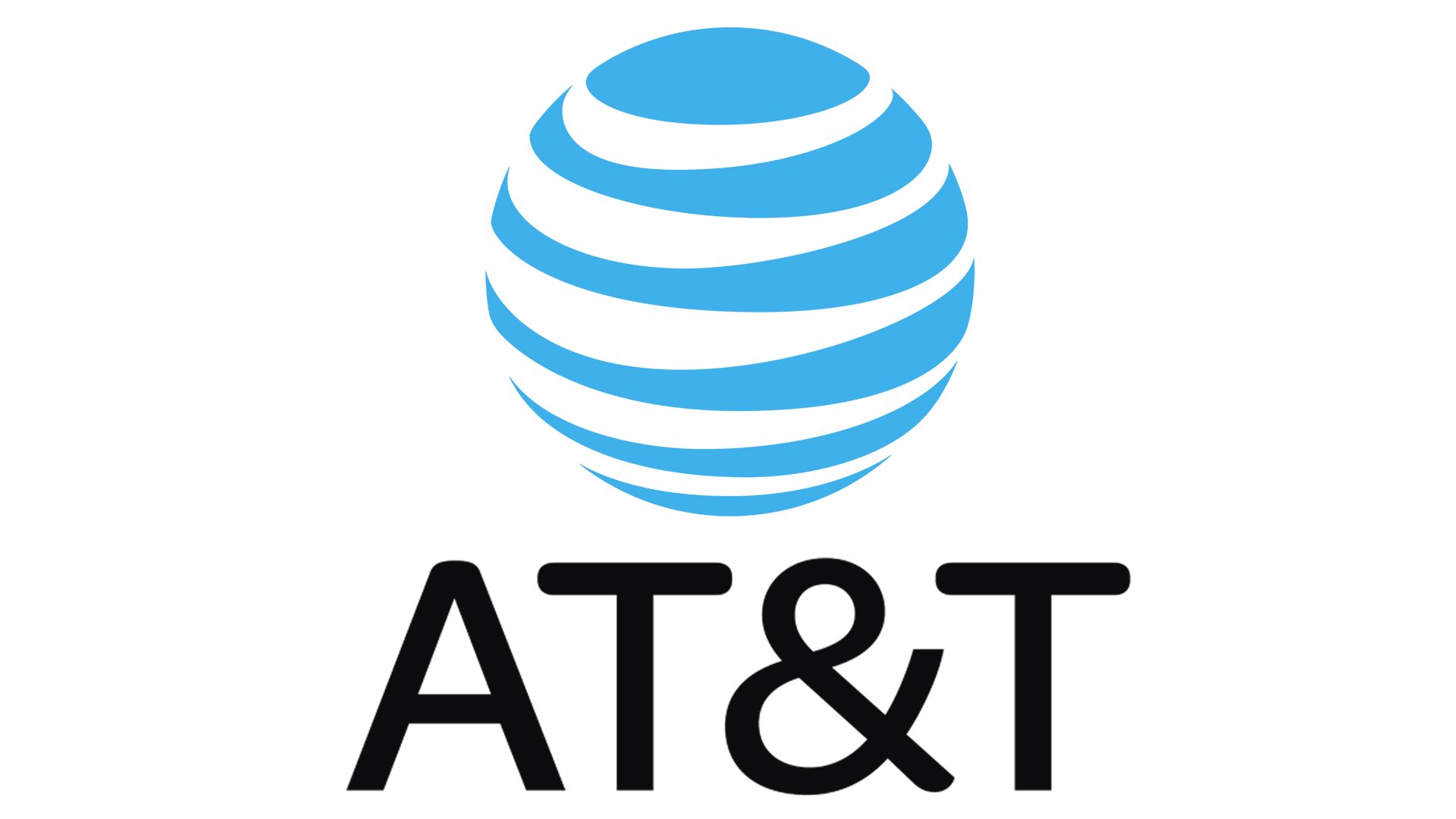Basketball was my world as a child and a young adult. I began playing at age five. Being female, I faced barriers at an early age. We had a basketball court in our driveway and even had neighborhood leagues. I was one of two girls to play among the boys, and when I would beat one of them in a game of horse or one-on-one, I’d get locked in the garage. Early on, then, I learned to carefully manage the ego of boys.
I spent endless hours playing basketball, either with my brothers or by myself. I had goals to play basketball in college and envisioned playing on television, being in newspapers and magazines. Early on I faced challenges. In middle school I was prohibited from competing in the Knights of Columbus Hoop Shoot because I was a girl. Rather than accepting exclusions, I waited until the competition was over and walked out and shot my ten free throws: yep, ten for ten. The boy who won shot nine for ten. I carried this pride inside hoping for the day I could showcase my skills on a larger stage.
My basketball career officially began in high school where I played junior varsity my freshman year. My sophomore, junior and senior years I was a varsity starter, earning a State title, Division titles, three-all conference, three all-state, and an all-American award.
All the accolades were overshadowed by the shame I internalized, though, because as I dated boys I was attracted to girls. The only lesbian role models I had were a few women from the college in my hometown of Havre, Montana. I was raised Catholic and knew I would be banned from the church and perhaps ostracized by my family if they found out.
I was recruited by most major conferences, and accumulated a bankers’ box full of letters offering me scholarships. A rule in our household was, “You will go to college out of state and to a private school.” My parents wanted us to see more than just our small Montana town.
Letters from Montana schools went directly into the trash, as I knew I was going away to play on a bigger stage. Despite telling the Montana schools I wasn’t interested, University of Montana coach Robin Selvig was relentless and continued to call.
Roadblocks and Detours
My dream was about to come true. I decided to accept a full ride scholarship to Gonzaga University in Spokane. I chose Gonzaga because I knew the coach was a lesbian. Even though I was deep in the closet, I felt safe knowing I would be accepted for who I was.
As a freshman at Gonzaga I started every game—until February when I suffered a major injury. After stealing the ball and going the entire length of the court to score, I was violently undercut while laying the ball in the basket. The impact of the collision knocked me unconscious and I was taken to the hospital by ambulance. The on-call doctor arrived and began poking my toes with a pin asking if I could feel it. When I realized I had lost feeling, my life flashed before my eyes. How could this be? After a short stay in the hospital, I learned I had a broken vertebra and the tissue surrounding the sciatic nerve had hemorrhaged. The university had a hospital bed moved into my dorm room and hired a bedside nurse to be with me part time. I was told by the doctor that I would not be able to play basketball competitively again. He said I needed extensive physical therapy to regain the strength to even run again. But, after a couple months, I was walking and determined to play Division I basketball again.
I went home to Montana where I would work on my strength in hopes of returning to Gonzaga. Shortly after returning to Havre, I received a phone call from Gonzaga’s athletic trainer, who told me I should not play again because I risked paralysis. So there I was, back in a place where I felt unsafe as a lesbian, but a place where I was revered as one of the best basketball players to come out of the state.
Part of my strength conditioning was done with a kind, confident trainer at Montana State University-Northern who was also a lesbian. She provided me with tips on who was gay and who was not. Over time, too, I developed a relationship with the assistant coach, and it was this relationship that ultimately outed me to my mom. She wanted me to see the family doctor since, she said, “Being with a woman is not normal.” But it sure felt normal to me!
First I built up enough strength to run stairs and then eventually the court. This was great, yet I still lacked about 40 percent of my peak athletic abilities. Apparently the basketball coach at MSU saw me as being at 100 percent, and offered me a full ride scholarship to play for him. I viewed this as an opportunity to play again. Maybe not at the level I once had, but I looked forward to the opportunity to get back to doing what I loved.
Successes and Walls
I played for MSU where I was chosen the 1981-82 Frontier Conference MVP, an honor that no woman had ever accomplished before. Despite my athletic successes, I had to leave Havre for a safer place. After the season I told the coach I wanted to leave to pursue educational opportunities unavailable at MSU. The coach, Loren Baker, was not okay with this request and told me I’d be sorry for leaving. I left and never looked back.
Next stop, University of Montana, where there was a safe haven for lesbians—or so I thought. Before I left Havre for Missoula in the summer of 1982, I called the coach of University of Montana and told him I was coming. He was excited and got me a coaching job at one of the local high schools and arranged for me to begin practicing with the team. After two weeks of it, the assistant coach called me into her office to tell me Coach Robin didn’t allow “my type” in his program. Robin never spoke to me and never returned my calls. Soon after being told I was being dumped from the University team, the athletic director at the high school told me to turn in my keys after my last game. I finished coaching with parents sitting behind the bench making comments about me being a lesbian, and I had parents pull their girls from the team because I was the coach.
I boarded a Greyhound bus with a bottle of rum and a liter of coke. I was accompanied by a friend who knew people living in Billings. She informed me that there was a large lesbian community in the city, and she helped me numb the pain of rejection and public humiliation. We finished the rum and coke 100 miles into the trip. We purchased more alcohol and settled in for the remaining 350 miles.
Upon arriving in Billings I headed to the Eastern Montana College campus and found the gymnasium where I played in pickup games of basketball. I played hard and buried myself in the game that had provided me an identity and an escape. The intensity with which I played was fueled by the anger and sadness I was feeling but was unable to identify. While taking a water break, the coach of the women’s basketball team approached me and offered me a full ride scholarship if I lost ten pounds. Ironically, that coach was Ted Anderson, who had left my high school team after we won state.
Sweet, another chance to play! I was grateful and overjoyed to be given this opportunity. I felt comfortable with the decision, too, since Ted was like a dad to me in high school and I was good friends with two of the women on the team. The first day of practice was an exciting day for me, until I was introduced and no one would offer any kind words of support or acceptance. In fact, the two women who were my friends would not even look at me. Once scrimmage started I got into my groove, playing defense and hand checking another offensive player, when suddenly she stopped and smacked my hands and bellowed out, “Don’t you touch me again you fucking dyke!”
Coach called for a water break and time to cool down. I headed to one of the two water fountains and the rest of the team lined up at the other fountain. After practice in the locker room, I was left alone to shower as the entire team packed their belongings and left.
Fighting for the Game
This was a low point in my life. I was being rejected by people who had looked up to me and who were my friends prior to my injury at Gonzaga. I had no support. Some of the members on the team were lesbians but they had to keep quiet and go along with the bullying in order for their closet doors to remain securely closed.
Exactly one week after that first practice with the team Coach Anderson and his closeted lesbian assistant told me the team had a meeting and voted me out. I pleaded with him to allow me to play. I asked why he, as the coach, couldn’t simply veto the ruling. He simply stated he didn’t want to see me room by myself, sit by myself on the bus, and go to the malls on trips and have to be by myself.
At that point I didn’t care how bad the bullying felt or how people treated me, I just wanted to play. Coach Anderson told me the team made the decision and he was honoring it. He told me I could keep the scholarship for the rest of the year if I wanted. Thanks, Ted.
Once again I ended up back in Havre at my parents’ home where I was told I was going to a private Catholic college in Kansas where all my siblings except for one went to college. I thought my mom was trying to change me by sending me to the nuns to save my soul. I told my parents there was no way I would go.
Days later I received a phone call from Jo Buysee, Montana Tech’s women’s basketball coach (who was a lesbian), informing me that Loren Baker (the coach of Montana State University-Northern) called all the coaches in Montana to tell them I was a lesbian and had a drinking problem. This was enough to have me rejected from two universities and have the door closed to any opportunity to play college basketball again. She was offering an opportunity for me to play on their team for the year. I was battered, bullied, and I had little passion left, not to mention my spirit had been broken. Instead of giving up, I saw Jo as someone who understood the rejection and was reaching out to me. I enrolled in summer classes to become eligible and played for one season.
Coming to Terms
I was born with a gift to play basketball, and with that grew a passion that fueled my dreams to play on a big stage and be a role model for young girls. I didn’t want other girls to be excluded from competing in Hoop Shoot because of their gender.
My love for basketball wasn’t reciprocated—in fact the unsupportive social context into which I was received forced me to abandon the sport entirely. After a decade of self-reflection, which included making San Francisco my home for a time, I learned how to be resilient, driven, and compassionate, all experiences which have contributed to making me a better mom, spouse, and daughter today.
The love I had for basketball was reinvigorated by my LGBTQ community in San Francisco where I volunteered for individuals infected with and affected by HIV Aids. 1991 was a time where I had friends and acquaintances who were dying, and volunteering helped me direct my passion for those who were slighted by society.
I was brought to Madison in 2004 with a goal of getting my PhD in epidemiology at the UW. I met my wife Holly at work and we legally married last year during the “window.” We live together in Evansville with our two beautiful daughters Amara, 6, and Maia, 8.
I have returned to the financial services industry, working at New York Life, which I chose because they support me in being who I am and support my goal of taking care of the LGBTQ community. I have also returned to my love of basketball and play as often as I can.


























0 Comments